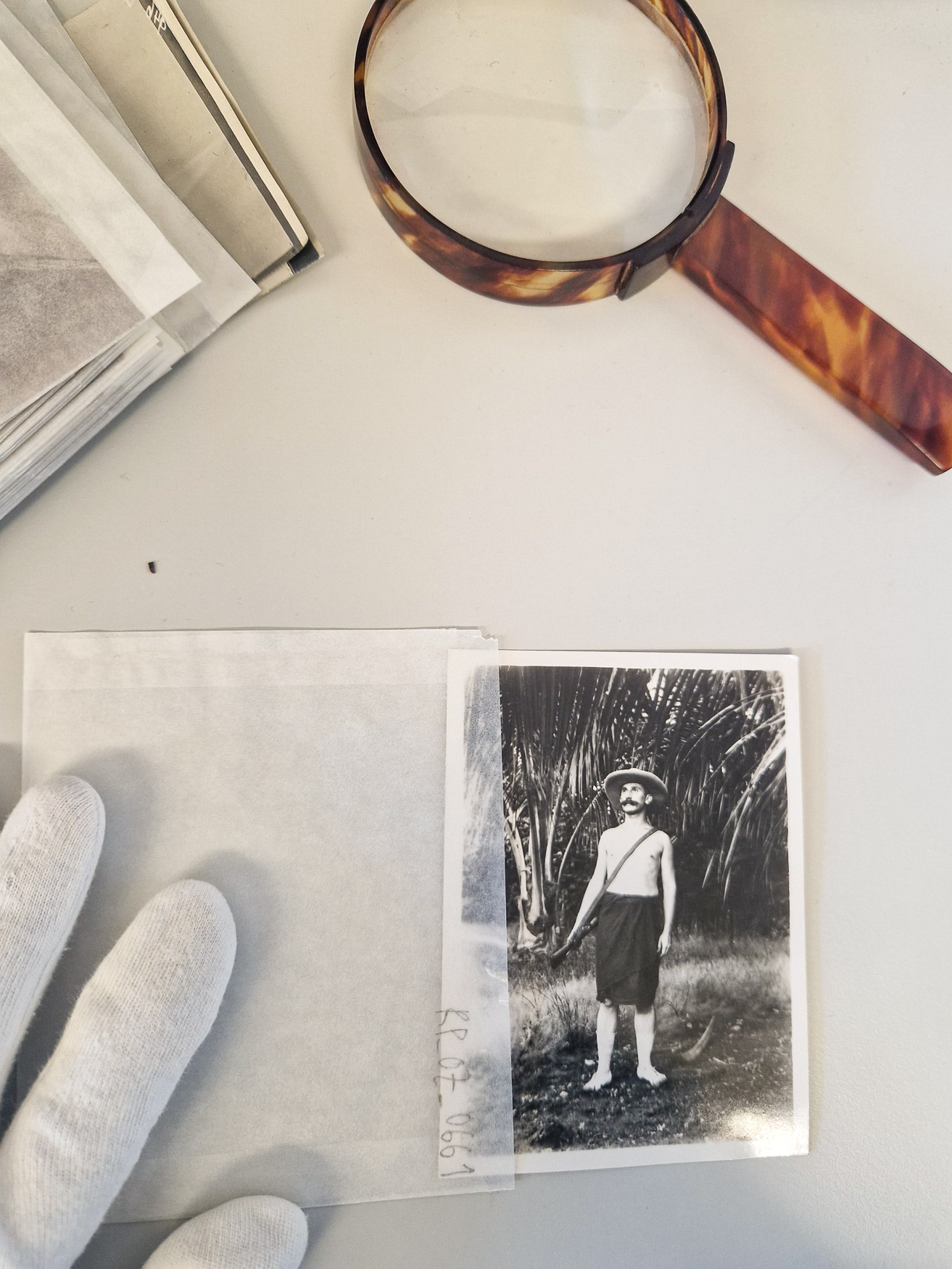The ‘Expedition’ of the Viennese Anthropologist Rudolf Pöch to Papua New Guinea (1904–1906)
The starting point for this project on the entangled colonial history of sound recordings from Papua New Guinea, was the CD-edition Papua New Guinea (1904-1906): The collections of Rudolf Pöch, Wilhelm Schmidt, and Josef Winthuis, published by the Phonogrammarchiv in 2000. The scholarly commentary on the 94 surviving sound documents was written by ethnomusicologist Don Niles, based on his study of the original sources in Vienna. The majority of the documents analyzed at the time came from Pöch himself.
The picture shows examples of the relevant materials currently found in the Phonogrammarchiv: handwritten descriptions of the sound recordings in three volumes of protocols, a metal matrix and a wax disc from this collection, the CD-edition and the complete set of epoxy resin disc copies.
Almost a quarter of a century later, this website brings together the results of a structured search, review and documentation of additional written, material and visual primary sources from the hitherto little-noticed ‘expedition’ to Southeast Asia and Oceania.
Work with a portrait of Rudolf Pöch from his trip to Papua New Guinea, ca. 1904-1906 (source of the original photograph: Institute for Evolutionary Biology at the University of Vienna, shelfmark: RP OZ 0661). Photo of the collage by Alexander Silaen, 2023.
“Pöch – again?”
During conversations as part of the project, we were confronted with this question several times. Many people who work in the context of archives and the history of science in Austria have long been familiar with Pöch. Various projects have already dealt with this controversial Austrian ‘explorer’ / ‘pioneer’ and his ‘legacy’.
Essentially, it is not our intention to expand Pöch’s biography. His racist and violent acts during his ‘expeditions’ are well known. Rather, we are asking questions about how to deal with the historical sources against this background. Who has access to the extensive material that Pöch ‘collected’ and produced? And how might we realize a project or website that takes one colonial scientific journey as an example of a wider phenomenon, without centering one person?
The search for sources on this specific entangled colonial history was characterized on the one hand by the central research question, but also by current discourses on restitution and (re)circulation. In any case, it was linked to the aim of making visible the amount and variety of historical traces, which may contribute to a reappraisal of this history, and to making them findable today.
Bringing together and processing the relevant information is the essential first step for future research, for example on parts of the ‘collections’ or special aspects in connection with Pöch’s journey to Papua New Guinea.
The
Project Team
About us
This website is a result of the project, “The entangled colonial history of sound recordings: The expedition of the Viennese anthropologist Rudolf Pöch to Papua New Guinea (1904-1906)”, for which Cornelia Gruber and Clemens Gütl received funding from the City of Vienna – MA 7 via the Austrian Academy of Sciences. Between October 1, 2023, and November 30, 2024, they acted as principal investigators of the project. The main researcher was the historian of science Alexander Silaen. Petzi Beneš corrected, translated, and entered the texts into this website.
Our Network
The list of institutions where primary sources on Pöch’s journey to Papua New Guinea are still available today was compiled in close consultation with the respective responsible persons and international researchers. We would like to take this opportunity to thank them for their constructive co-operation.
Margit Berner (Natural History Museum Vienna)
Reinhard Blumauer (Weltmuseum Wien)
Anette Hoffmann (Independant Scholar)
Hanin Hannouch (Weltmuseum Wien)
Hilary Howes (The Australian National University)
Manfred Kaufmann (Weltmuseum Wien)
Gerda Lechleitner (formerly Phonogrammarchiv of the Austrian Academy of Sciences)
Katarina Matiasek (University of Vienna)
Caroline McKinley (Weltmuseum Wien)
Don Niles (ehemals Institute of Papua New Guinea Studies)
Stefan Sienell (Archive of the Austrian Academy of Sciences)
Harald Wilfing (University of Vienna)
Andrea Zaremba (Natural History Museum Vienna)
Naturhistorisches Museum Wien

